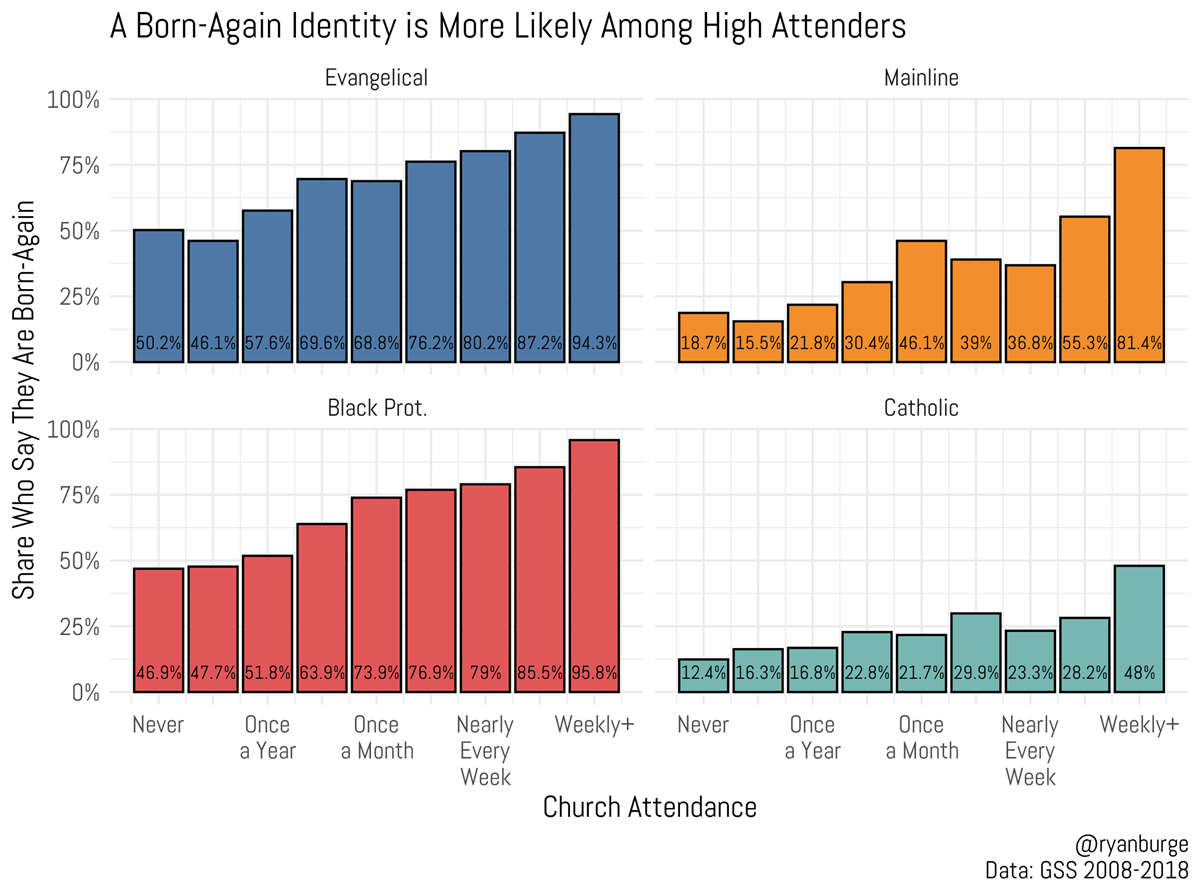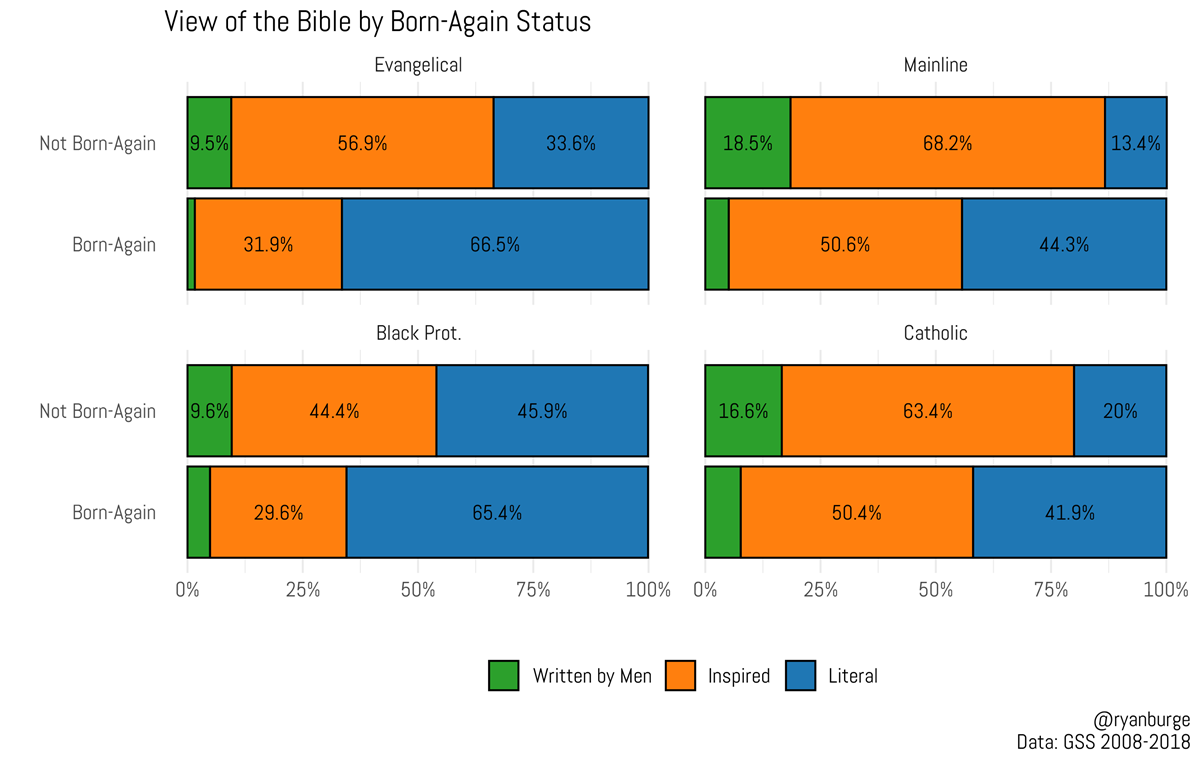One issue with Burge's reporting before pondering the larger question of why and what it might mean for the future: "The surprise comes with mainline Protestants, who have gone from 28 percent identifying as born again to 40 percent. And the portion of born-again Catholics has doubled (from 14% to 28%). Those increases are especially striking because neither tradition teaches that a born-again conversion is a necessary component of their faith." This is over-simplification at best, misleading (in an insulting way) at worst. Not every Christian community uses the same words and phrases in the same way. If you ask a Catholic, "Are you born again?" The answer is more likely to be 'no' than if you asked that same Catholic, "Have you made a personal commitment to Jesus Christ?" Does that mean that the Catholic Church doesn't teach the necessity of individuals making a commitment to Jesus Christ? Hardly they require it before any person can fully participate in the community, how else does one explain the milestones a young Catholic (or adult convert) goes through heading toward confirmation and first communion? Similar questions of phraseology could be applied to other non-evangelical Protestant denominations. The original survey question, first asked in 1988, was written from an Evangelical Protestant perspective, and likely confused many of the initial respondents from other Christian perspectives. Over the years, as the Culture Wars continued to rage, and the phrase "born again" became more a part of the cultural vernacular, it would not be surprising to see the number of those who answer the survey with a 'yes' increase as a result. Is that what's going on here or are deeper issues at work?
"Over the years, being born again may have evolved from being seen as a distinctive for evangelical Protestantism to a way to suggest that they are particularly active in their faith. Across Christian traditions, the more often a person attends church, the more likely they are to say they have had a born-again experience, regardless of their affiliation." This is a more likely explanation than the previous statement implying that Mainline Protestants and Catholics just don't teach the need for conversion.

These charts are the heart of the story, and tell the most important tale.
Some observations on the chart relating church attendance to self-identification as being "born again": (1) How is it that 50% of those who call themselves evangelicals and African-American Protestants, who NEVER go to church, still think that they're 'born again'? That's an absurdly high number or people who evidently have no real understanding of what is required of a disciple of Jesus Christ, because being a part of the body of Christ, serving the church and being under the tutelage of the Word of God isn't apparently a priority to that 50% who still identify themselves as being both 'born again' and belonging to one of those two groups without actually going to church. For Catholics and Mainline Protestants the numbers are less than 20% among those who never go to church, still higher than we should be comfortable with, but not the over-inflated 50%. (2) Going to church matters! I'm of course biased on this view, being an ordained minister called to lead a church, but that is what the Scriptures proclaim, and what 2,000 years of Church history attest, so I don't feel like I'm on shaky ground here in asserting the necessity of an individual Christian's (or 'Christian' as the case may be for those not-yet converted) connection to a local church. (3) Going to church more matters more than going to church less. That's a confusing sentence, but the charts seems fairly clear: those who go to church more regularly are more likely to have claimed to have made a personal commitment to Jesus Christ than those who go to church only infrequently. Go to church! No, Christmas and Easter are not sufficient. {Please come then if you don't go otherwise to hear about the Advent of Christ and then about his death and resurrection, those are key parts of God's redemptive story (all pastors are encouraged to see visitors at the holidays, they just want to see them more than that).}

First off, I have no love for the use of the term 'literal' when talking about the Bible; few words are more abused and less well understood. Also, why was this question written to make a dichotomy between 'inspired' and 'literal'? How can Scripture be the inspired but not 'literal' (ouch, it pains me to use it even with 'quotes') words of God? {See my 3 part discourse on the Bible to learn more about revelation, inspiration, interpretation, etc. What Every Christian Should Know About: The Bible} Aside from the structural issues with the way this question was written, the data here is also interesting. The more often people attend church, the more likely they are to honor the authority of God's Word (whether calling it 'inspired' or 'literal') and the less likely they are to consider it to be simply 'written by men'. Not surprisingly, those who know more about God's Word, who hear it preached to them more regularly, and who place themselves under the instruction of the Holy Spirit, respond by embracing it. Those who avoid the fellowship of God's people, who don't prioritize worship of God, tend to view God's Word with less reverence. None of this is surprising to anyone working in vocational ministry. Not surprising at all.
"It would appear that the term “born again” has evolved somewhat among the American public. What used to be seen as a touchstone experience for many evangelicals who went forward at a revival, youth camp, or especially moving Sunday worship service, now seems to mean something more. In essence, the word seems to have been adopted by people of other faith traditions as a way to indicate that they are a devout believer. The data suggests that individuals take the term to mean that faith plays an important role in their life and their religious activity serves more than a social purpose." To quote my former college professor at Cornerstone University, Prof. Andy Smith: "Word usage determines word meaning." The term 'born again' has evolved. What was once a technical term that baffled many of the survey takers in the 1980's has now become a more general term that more broadly reflects its original biblical meaning: devout believer. It doesn't take a recitation of a 'sinner's prayer' to become a Christian, it takes a changed heart, an act of faith, that comes from the calling of the Holy Spirit and results in a life whose direction has changed and results in the ongoing display of the Fruit of the Spirit. It is a good thing if people in the Church are more focused on having one's life direction changed than on having a single experience.
What then does all of this mean? The short version is this: The decline of the 'Christian American' culture is asking casual people to make a choice. It isn't as easy as it used to be to float along in a Christian inspired river without making your own commitment. When the change required of conversion becomes more stark, and the counter-cultural cost of discipleship becomes more evident, those who never go to church, but consider themselves to be 'Christians', shrink, while those who both openly reject Christianity/The Church, and those who openly embrace it, gain numbers. As these trends continue, the commonalities between committed members of Christian communities will only grow more clear, the reasons for cooperative ministry more compelling, and if God is gracious to us, the percentage of those in some way connected to the Church willing to make a personal commitment (and follow through by being a part of the local church) will grow.

No comments:
Post a Comment